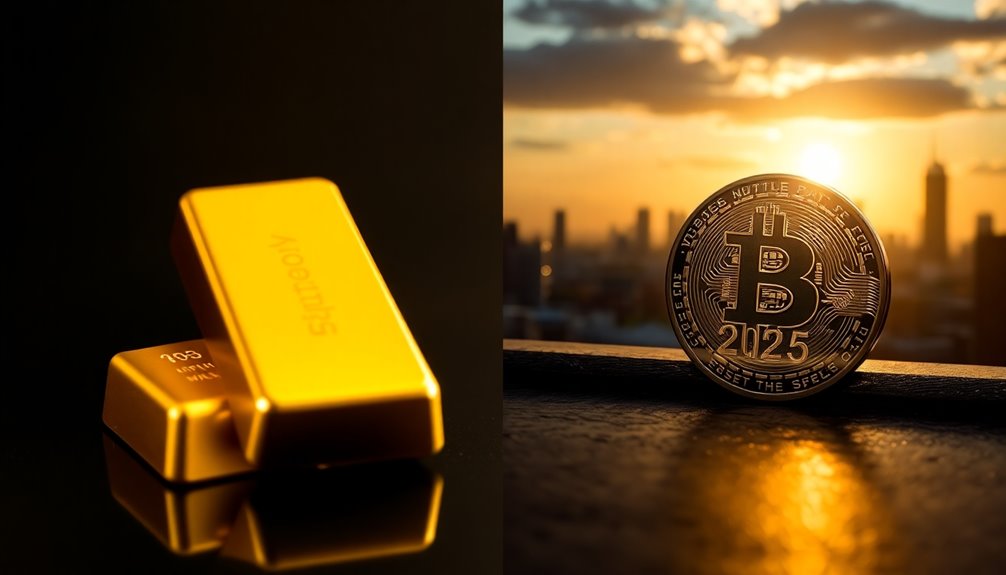As you consider your investment strategy for 2025, the choice between Bitcoin and gold could define your financial future. Gold's established reputation for stability contrasts sharply with Bitcoin's allure of high returns but comes with significant risk. Each asset has its pros and cons, influenced by market trends and environmental concerns. Which one will truly serve as your safe haven? The answer might surprise you.

What makes a true safe haven in today's volatile economic landscape: Bitcoin or gold? As you navigate the world of investments, it's crucial to understand the historical significance and stability that both assets offer.
Gold has been a symbol of wealth for over 5,000 years, serving as a reliable store of value across civilizations. Its stability during economic downturns makes it a trusted safe-haven asset, often sought after in times of financial uncertainty.
On the other hand, Bitcoin emerged in 2009, introducing a decentralized digital currency that promises autonomy and censorship resistance. However, its high volatility presents a riskier investment compared to gold.
When considering technological advantages, Bitcoin boasts features that enhance its appeal. Operating on a decentralized network, it offers transparency through blockchain technology, allowing you to track transactions on a public ledger. Additionally, Bitcoin's absolute scarcity sets it apart as a limited asset, with a maximum supply of 21 million coins.
You can transfer Bitcoin globally with minimal fees and high speed, making it incredibly portable. In contrast, gold has physical limitations; transporting and storing it in large quantities can be challenging.
Innovations like the Lightning Network further improve Bitcoin's scalability and transaction efficiency, positioning it as a modern alternative.
Economically and geopolitically, gold has a proven track record as an inflation hedge, maintaining purchasing power over time. Its prices tend to rise during geopolitical crises, providing a sense of stability.
Meanwhile, Bitcoin behaves more like a risk asset, often reacting to financial uncertainty with significant price swings. The evolving regulatory environment surrounding Bitcoin also introduces uncertainty, which may affect its value.
Looking at investment potential, Bitcoin has achieved dramatically higher returns than gold over the past decade, attracting those seeking aggressive growth.
However, gold offers modest growth potential that leans towards wealth preservation, making it a safer choice for some investors.
Environmental impact is another consideration; gold mining is energy-intensive and has a larger carbon footprint, whereas over 50% of Bitcoin's energy comes from renewable sources, reducing its environmental impact.
Ultimately, both assets provide valuable diversification opportunities for balancing risk and reward in your portfolio.
As you look toward 2025, consider how both Bitcoin and gold can fit into your long-term strategy. Each has its unique strengths and weaknesses, and understanding these will help you make informed decisions in this ever-changing economic landscape.









